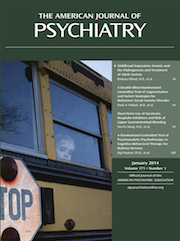Patient Personality and Therapist Response: An Empirical Investigation
Abstract
Objective
The aim of this study was to examine the relationship between therapists’ emotional responses and patients’ personality disorders and level of psychological functioning.
Method
A random national sample of psychiatrists and clinical psychologists (N=203) completed the Therapist Response Questionnaire to identify patterns of therapists’ emotional response, and the Shedler-Westen Assessment Procedure−200 to assess personality disorders and level of psychological functioning in a randomly selected patient currently in their care and with whom they had worked for a minimum of eight sessions and a maximum of 6 months (one session per week).
Results
There were several significant relationships between therapists’ responses and patients’ personality pathology. Paranoid and antisocial personality disorders were associated with criticized/mistreated countertransference, and borderline personality disorder was related to helpless/inadequate, overwhelmed/disorganized, and special/overinvolved countertransference. Disengaged countertransference was associated with schizotypal and narcissistic personality disorders and negatively associated with dependent and histrionic personality disorders. Schizoid personality disorder was associated with helpless/inadequate responses. Positive countertransference was associated with avoidant personality disorder, which was also related to both parental/protective and special/overinvolved therapist responses. Obsessive-compulsive personality disorder was negatively associated with special/overinvolved therapist responses. In general, therapists’ responses were characterized by stronger negative feelings when working with lower-functioning patients.
Conclusions
Patients’ specific personality pathologies are associated with consistent emotional responses, which suggests that clinicians can make diagnostic and therapeutic use of their responses to patients.



